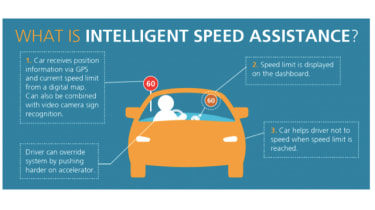Speed limiters now required on all new cars: know the rules and how they work
Speed limiters are required on all new cars from July 7 2024 but what does that mean for motorists and consumers…

All new cars sold in the European Union from 7 July 2024 must have Intelligent Speed Assistance (ISA) speed limiter tech fitted by law. This means manufacturers will be forced to update any cars launched prior to July 2022, the date when ISA systems were first mandated for newly introduced models.
While the EU rule has no legal force in the UK, manufacturers selling cars across the continent have shown no sign of wanting to provide ISA-free variants for UK buyers since that law on new model introductions was introduced two years ago.
Promoted as a road-safety measure by European legislators, ISA is also part of the increasing technology cost-burden facing new car buyers. It uses cameras that recognise speed limit signs, as well as data from GPS and sat-nav systems, to determine the speed limit on any given stretch of road. If the car breaks that limit, a beep or other warning - such as a ‘haptic’ vibration through the steering wheel or accelerator pedal - will alert the driver to the transgression. If a driver doesn’t respond to override the system by braking - or indeed accelerating should circumstances demand it - then the car will slowly reduce power and automatically slow to the limit. Drivers are currently able to turn their ISA speed limiter systems off, but the EU mandate states ISA must automatically reset to ‘on’ every time the vehicle is started.
While speed merchants and careless drivers will not be automatically reined back by their cars just yet, the ISA systems could be a step towards implementation of fully automated speed controls. We recently reported on a speed limit ‘geofencing’ project being explored by Ford in Cologne, which prevents drivers from speeding in prescribed geographical areas, and speed control is also a key component of expected advances in autonomous or self-driving technology.
While the EU rules have been applied after Brexit so aren’t adopted automatically in the UK, there’s every chance we’ll get the same systems here regardless of any government action. Pressure from the Euro NCAP safety testing body and the desire of manufacturers to have commonality of parts to save on production cost and complexity will be the primary drivers.
That said, although the outgoing Conservative government ruled out making ISA mandatory, it’s entirely possible that the new Labour administration will take a different approach if it seeks closer alignment with the European Commission.
Why has the EU brought speed limiters in?
In a word, safety. Chief proponent of ISA is the European Transport Safety Council (ETSC) which says the move will reduce collisions by 30 per cent and road deaths by 20 per cent. The EU has a target of zero road deaths by 2050.
ISA, along with other measures coming in at the same time such as standard autonomous emergency braking (AEB), could prevent 140,000 serious road traffic injuries by 2038, it is said.
Crash test organisation EuroNCAP agrees: “Greater adherence to speed limits will avert accidents and mitigate the effects of those that occur”.
How do ISA speed limiters work?
Many new cars are already fitted out with the technology they need to restrict their speed autonomously. With a combination of speed-sign recognition cameras, sat-nav and clever software, a car can at any time know where it is, how fast it is going and what the speed limit is. It can then restrict engine power so it can’t exceed that speed limit. It’s a form of always-on intelligent adaptive cruise control.

Can you turn ISA speed limiters off?
At this stage in its development yes, the system can be turned off – but you have to deactivate it at the start of every journey. Otherwise it will kick in automatically each time you turn the car on and drive off.
If you push hard enough on the accelerator you can override a system that limits your speed in real time as well - to complete an overtaking manoeuvre for example. The systems are likely to be accompanied by a range of haptic, visual and audio warning signals to tell you that you’ve exceeded the speed limit. The exact features of the systems will vary from manufacturer to manufacturer.
The technology is not foolproof and cars that rely solely on sign-recognition cameras could get confused when there is no sign, for instance on slip roads between motorways. You wouldn’t want to be restricted to 30mph when joining the M1.
Some signs get damaged, are missing, are conditional on traffic or weather conditions, and others may be unreadable, for instance those at temporary road works. That’s why the ISA systems can be disabled.
Will ISA mean an end to speeding tickets?
It will not. As already mentioned, you will still be able to override the system. The driver will still be responsible for adhering to limits – even if ISA malfunctions. “The driver is always responsible for adhering to the relevant traffic rules,” says the European Commission, and naturally the same applies here in the UK.
What other mandatory safety aids are coming?
As well as ISA and autonomous emergency braking, the latest EU regulations for cars on sale today require a ‘black box’ data logger, emergency stop signals, driver fatigue detection system and lane keep assist.
Will speed limiters be a useful safety boost or another annoyance for motorists? Have your say in the comments...
Find a car with the experts





